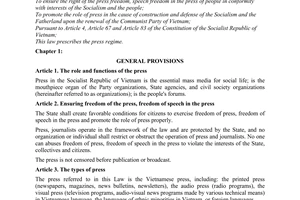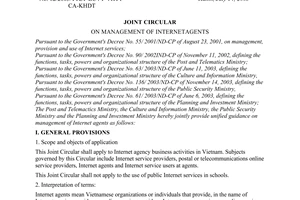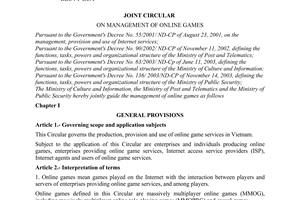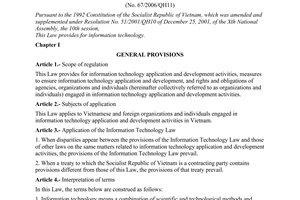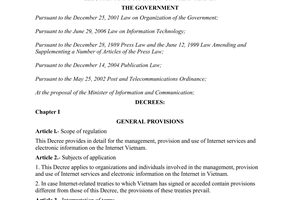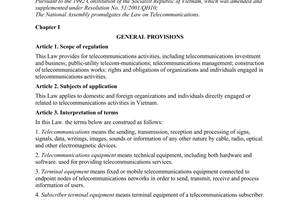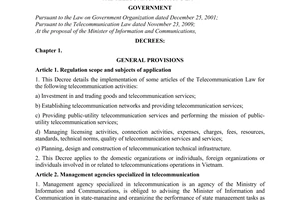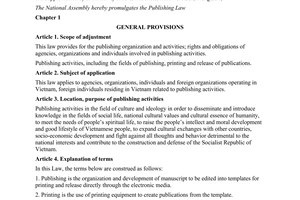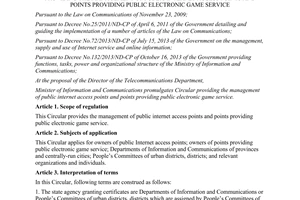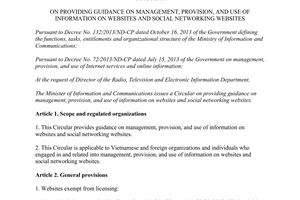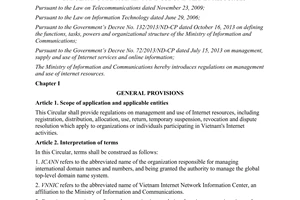Nội dung toàn văn Decree No. 72/2013/NĐ-CP internet services and online information
|
THE GOVERNMENT |
SOCIALIST REPUBLIC OF VIETNAM |
|
No. 72/2013/ND-CP |
Hanoi, July 15, 2013 |
DECREE
ON THE MANAGEMENT, PROVISION, AND USE OF INTERNET SERVICES AND ONLINE INFORMATION
Pursuant to the Law on Government organization dated December 25, 2001;
Pursuant to the Law on telecommunications dated November 23, 2009;
Pursuant to the Law on Information technology dated June 29, 2006;
Pursuant to the Law on Press dated December 28, 1989 and the Law on Amendments to the Law on Press dated June 12, 1999;
Pursuant to the Law on Publishing dated November 20, 2012;
At the request of the Minister of Information and Communications;
The Government promulgates a Decree on the management, provision, and use of Internet services and online information,
Chapter 1.
GENERAL PROVISIONS
Article 1. Scope of regulation
This Decree specifies the management, provision, use of Internet services, online information, and online games, and assurance of information security; rights and obligations of organizations and individuals to the management, provision, use of Internet services, online information, online games, and assurance of information security.
Article 2. Subjects of application
This Decree is applicable to Vietnamese and foreign organizations and individuals engaged in or related to the management, provision, use of Internet services, online information, and online games, and assurance of information security.
Article 3. Interpretation of terms
In this Decree, the terms below are construed as follows:
1. Network refers to telecommunications network (fixed, mobile, Internet) and computer network (WAN, LAN)
2. Internet services are a form of telecommunications services, including Internet access service and Internet connection services:
a) Internet access service is the services that allow Internet users to access the Internet;
b) Internet connection service is the service that allows Internet service providers and telecommunications service providers to connect with each other to share Internet load.
3. Internet exchange point is a system of telecommunication devices installed by an organization or enterprise to provide Internet connection services.
4. Internet service providers are telecommunication enterprise that provide internet services defined in Clause 2 of this Article.
5. Internet agents are organizations and individuals that provide Internet access services for users under internet agent contracts with Internet access service providers to get commission, or resell Internet access services to reap benefits from price differences.
6. Public Internet access points include:
a) The locations where Internet agents may provide services legally;
b) Public Internet access points of enterprises are the locations under the management of affiliated units or representatives of Internet service providers where Internet access services are provided for Internet users.
c) Public Internet access points in hotels, restaurants, docks, bus stations, coffee shops, and other public places are locations where organizations and individuals may legally provide Internet access services for Internet users.
7. Internet users are organizations and individuals that enter into service contracts with Internet access service providers or public Internet access points to use the applications and services on the Internet.
8. Internet resources are the names and numbers under the management of Vietnam, including:
a) The country code top-level domain names “.vn” (hereinafter referred to as “.vn" domain names) other domain names related to national interests of Vietnam; Internet addresses, network codes, names and other numbers that are allocated to Vietnam via Vietnam Internet Network Information Center (VNNIC);
b) Other international domain names, Internet addresses, names and numbers allocated to organizations and individuals in Vietnam by international organizations.
9. Online game services (hereinafter referred to as game services) are the provision of access to the Internet and online games.
10. Online game service providers (hereinafter referred to as game service providers) are enterprises established in accordance with Vietnam’s law that provide game services by establish a system of equipment and the legal use of video games.
11. Gaming centers are places where organizations and individuals may legally provide players with access to the Internet and video games by establishing a system of equipment at such locations.
12. Online game players (hereinafter referred to as players) are the individuals that enter into contracts with game service providers or gaming centers to play video games
13. Online information is information transmitted, collected, and processed via the Internet.
14. Public information is online information of an organization or individual that is publicly provided without identifications or addresses of receivers.
15. Private information is online information of an organization or individual that is not publicized by that organization or individual, or only provided for a group of receivers that are identified.
16. Private information is the information associated with the identifications of individuals, including names, ages, addresses, ID numbers, phone numbers, email addresses, and other information defined by law.
17. Information service mean provision of public information for service users.
18. Official sources are the information posted or published on Vietnam’s newspapers or websites of the State according to the laws on press and intellectual property.
19. News is information that is collected from multiple sources about politics, economics, culture, or society.
20. Information system is a combination of telecommunications and IT equipment, including hardware, software, and database serving the storage, processing, transmission, sharing, exchange, provision, and use of information.
21. A website is a system of information used for establishing one or multiple pages of information that are displayed in the form of symbols, digits, text, video, audio, and other forms of information serving the provision and use of information on the Internet.
22. Social networking site is a system of information that provides its users with services such as storage, provision, use, search, sharing, and exchange of information, including the provision of private websites, forums, online chats, audio and video sharing, and other similar services.
23. Information safety is the protection for information and information system from illegal access, use, revelation, interruption, or alteration of information in order to ensure the integrity, security, and utility of information.
24. Information security is to ensure that online information does not threaten national security, social order, state secrets, the lawful rights and interests of organizations and individuals.
Article 4. Policies on the development and management of Internet and online information.
1. Encourage the use of Internet in all economic and social activities, especially in education, health care, and scientific research in order to raise productivity, create jobs, and improve the quality of life.
2. Encourage the development of contents and applications in Vietnamese to serve Vietnamese community on the Internet. Enhance the upload of healthy and useful information to the Internet.
3. Develop broadband Internet infrastructure in schools, hospitals, research institutes, libraries, state agencies, enterprises, public Internet access points, and households. Focus on the provision of Internet services in rural areas, remote areas, bordering areas, islands, and areas facing extreme socio-economic difficulties.
4. Prevent the abuse of the Internet to threaten national security, social order and safety, to contradict the code of ethics, traditions, and law, Take measures to protect children, adolescents and young people from negative impacts of the internet.
5. Ensure that only legal information is transmitted, even across the border, to Internet users in Vietnam.
6. Encourage and facilitate the use of “.vn" domain names, domain names in Vietnamese, and the conversion to addresses using IPv6 technology (hereinafter referred to as IPv6 technology).
7. Intensify international cooperation in Internet on the basis of mutual benefits, conformity with Vietnam’s law and the International Agreements to which the Socialist Republic of Vietnam is a signatory.
Article 5. Prohibited acts
1. Using the provision and use of internet services and online information for:
a) Opposing Socialist Republic of Vietnam; threatening the national security, social order and safety; sabotaging the national fraternity; propagating wars and terrorism; arousing animosity and among races and religions.
b) Propagating and incite violence, obscenity, pornography, crimes, social problems, superstition; contradicting national traditions;
c) Revealing state secrets, military, economic, diplomacy secrets, and other secrets defined by the State;
d) Providing false information, slandering or damaging reputation of organizations or dignity of individuals;
dd) Advertising, propagating, trading in banned goods or services; spreading banned publications;
e) Impersonating other organizations and individuals to spread false information, which violates the lawful rights and interests of other organizations and individuals.
2. Illegally obstructing the lawful provision and access to information, the provision and use of lawful services on the Internet of other organizations and individuals.
3. Illegally obstructing the operation of “.vn” domain name system servers (DNS servers), lawful operation of Internet service and online information provision systems.
4. Illegally using passwords of other organizations and individuals, private information, and Internet resources.
5. Creating illegal links to lawful domain names of other organizations and individuals; creating, installing, spreading harmful software or computer virus; illegally accessing or taking control of info systems; making attack tools on the Internet.
Chapter 2.
MANAGEMENT, PROVISION, AND USE OF INTERNET SERVICES INTERNET RESOURCES
SECTION 1. INTERNET SERVICES
Article 6. Licensing internet services
1. Enterprises may provide internet services after obtaining the license to provide internet services.
2. The issuance, adjustment, extension, revocation, and reissuance of the license to provide internet services are provided for in Article 35, Article 36, Article 38, Article 39 of the Law on telecommunications, Article 18, Article 23, Article 24, and Article 28 of the Government's Decree No. 25/2011/ND-CP dated April 06, 2011 o elaborating some Articles of the Law on telecommunications.
Article 7. Rights and obligations of Internet service providers
Apart from the rights and obligations of telecommunications service providers specified in Clause 1 Article 14 of the Law on telecommunications, Internet service providers also have to:
1. Send notice of official internet service provision to the Ministry of Information and Communications (the Vietnam Telecommunications Authority) before the official service provision as prescribed by the Ministry of Information and Communications;
2. Register the form of Internet agent applications and internet service contracts with the Ministry of Information and Communications (the Vietnam Telecommunications Authority).
Article 8. Conditions for public Internet access points
1. An Internet agent may operate when the conditions below are satisfied:
a) The Internet agent business is registered;
b) An Internet agent contract is signed with the Internet service providers;
c) The provision of game services must comply with Clause 1 Article 35 of this Decree.
2. Owners of public Internet access points of enterprises are exempt from registering the Internet agent business and signing Internet agent contracts. The provision of game services must comply with Clause 1 Article 35 of this Decree.
3. Owners of public Internet access points in hotels, restaurants, docks, bus stations, coffee shops, and other public places shall:
a) Not register the Internet agent business nor sign Internet agent contract if services are provided free of charge;
b) Register the Internet agent business and sign Internet agent contract if services are charged;
Article 9. Rights and obligations of owners of public Internet access points
1. Internet agents have the rights and obligations below:
a) Establishing a system of terminal devices at the licensed place to provide Internet access services for users at the place;
b) Putting up the sign saying “Internet agent” together with the registration number;
c) Putting up the regulations on Internet service provision in noticeable positions, specifying the prohibited acts specified in Article 5 of this Decree, rights and obligations of Internet users in Article 10 of this enterprise;
d) Providing Internet access services in accordance with the quality and charges in the Internet agent contract;
dd) The rights and obligations of owners of gaming centers in Article 36 of this Decree.
e) Preventing Internet users from using the computers to commit the prohibited acts in Article 5 of this Decree.
a) Requesting the enterprise that signs the Internet agent contract to provide guidance and information about Internet access services, and facilitate the inspections and supervisions carried out by that enterprise;
h) Joining in the training courses in Internet offered by local state agencies and Internet service providers;
i) Complying with the regulations on information safety and information security.
2. Rights and obligations of owners of public Internet access points of enterprises:
a) Putting up the sign "Public Internet access points” which specify the name of the enterprise and number of the license to provide internet services;
b) The rights and obligations specified in Points a, c, dd, e, h, i Clause 1 of this Article.
3. Owners of public Internet access points in hotels, restaurants, docks, bus stations, coffee shops, and other public places where charged Internet access services are provided shall:
a) Comply with the opening and closing hours;
b) Have the rights and obligations specified in Points a, c, d, e, g, h i Clause 1 of this Article.
4. Owners of public Internet access points in hotels, restaurants, docks, bus stations, coffee shops, and other public places where Internet access services are provided free of charged shall:
a) Comply with the opening and closing hours;
b) Have the rights and obligations specified in Points a, c, e, h, i Clause 1 of this Article.
Article 10. Rights and obligations of Internet users
Apart from the rights and obligations specified in Clause 1 Article 16 of the Law on telecommunications, Internet users also have the rights and obligations below:
1. Using services on the Internet, except for the banned services defined by law.
2. Complying with the opening and closing hours of public Internet access points.
3. Do not resell Internet services in any shape or form.
4. Complying with the information safety, information security, and relevant regulations in this Decree.
Article 11. Internet connection
1. Internet service providers may connect with the international network, with each other, and Internet exchange points.
2. Vietnam National Internet eXchange (VNIX) is the Internet exchange point of Vietnam Internet Network Information Center, which is established by the Ministry of Information and Communications to:
a) Ensure the safety for the operation of the entire Vietnam’s Internet network when the domestic and international telecommunications networks malfunction;
b) Establish a network to experiment IPv6;
c) Connect with regional and international Internet exchange point;
d) Connect Internet service providers in a non-profit manner to raise the quality and reduce prices.
3. The Ministry of Information and Communications shall:
a) Specify the operation of VNIX;
b) Provide polices to enable Internet service providers to connect with each other, with VNIX and other Internet exchange points.
SECTION 2. INTERNET RESOURCES
Article 12. Domain name registration
1. The Ministry of Information and Communications shall manage “.vn" domain names and international domain names allocated to organizations and individuals in Vietnam by international organizations.
2. All organizations and individuals are entitled to register “.vn" domain names and international domain names.
3. “.vn" domain names shall be registered at domain name registrars.
4. The registration of “.vn" domain names must comply with the principles below:
a) Equitability and impartiality principle;
b) First come - first serve principle, except for the domain names put up for auction;
c) Conformity with the regulations on protection of “.vn" domain names in Article 68 of the Law on Information technology;
d) Conformity with the regulations on auction and transfer of domain names in the Law on telecommunications.
5. Domain names registered by organizations and individuals must not contain phrases that threatens the national interests or are contrary to social ethics and national traditions; domain names must avoid confusion or distortion due to ambiguity or absence of Vietnamese tone marks.
6. The organizations and individuals other than agencies of the communist party and state agencies must not register and use the domains that are names of agencies of the communist party and state agencies.
7. The Ministry of Information and Communications shall specify the conditions and procedure for registering and revoking “.vn" domain names.
Article 13. ".vn" DNS servers
1. “.vn” DNS server is the technical system that ensures the operation of “.vn" domain names on the Internet. The Ministry of Information and Communications (Vietnam Internet Network Information Center) shall establish and operate “.vn” DNS servers.
2. Internet service providers shall cooperate in connecting and routing in order to ensure the safe and stable operation of ".vn" DNS servers.
Article 14. ".vn" domain name registrars
1. ".vn" domain registrars are enterprises that provide “.vn" domain names registration and maintenance services.
2. Every ".vn" domain registrar may provide services when the conditions below are satisfied:
a) The enterprise is established in accordance with Vietnam's law, or an overseas organization signs a contract with an accredited registrar of Internet Corporation for Assigned Names and Numbers (ICANN);
b) The provision of domain name registration services is registered;
c) The technical capacity and personnel is sufficient for provision of domain name registration and maintenance services;
d) Contracts are signed with Vietnam Internet Network Information Center to become a ".vn" domain registrar.
3. ".vn" domain registrars have the rights and obligations below:
a) Organizing the registration and maintenance of domain names in accordance with law;
b) Sufficiently and accurately storing information about the organizations and individuals that register domain names as prescribed by the Ministry of Information and Communications;
c) Establishing DNS servers, service provision systems, and taking measures for ensuring safety for domain names and domain name data of organizations and individuals;
d) Being provided with guidance and information on domain name registration; facilitating the inspections carried out by the Ministry of Information and Communications;
dd) Refusing to provide services for the organizations and individuals that fail to comply with the regulations on domain name registration;
e) Suspending and revoking domain names at the request of competent authorities;
g) Domestic ".vn" domain registrars must use primary DNS servers that use “.vn" domain names when providing services;
h) Making and providing application forms and procedure for domain name registration as prescribed by the Ministry of Information and Communications;
i) Making reports, providing information, and cooperate with competent authorities.
Article 15. International domain name registrars in Vietnam
1. International domain name registrars are enterprises that provide international domain name registration and maintenance services in Vietnam.
2. Every international domain name registrar may provide services when the conditions below are satisfied:
a) The enterprise is established in accordance with Vietnam's law;
b) The provision of domain name registration services is registered;
c) Contracts are signed with ICANN or an accredited registrar of ICANN to provide international domain name registration services in Vietnam.
3. International domain name registrars have the rights and obligations below:
a) Managing information about the organizations and individuals in Vietnam that register international domain names, including their names, residences, phone numbers, fax numbers, email addresses of organizations, dates of birth, ID numbers, dates of issues, residences, phone numbers, and email addresses of individuals;
b) Instructing organizations and individuals that register international domain names to use international domain names in accordance with regulations of the Ministry of Information and Communications;
c) Sending reports to the Ministry of Information and Communications;
d) Providing information and cooperate with competent authorities to settle the cases related the international domain names under their management.
Article 16. Settling disputes over domain names
1. Disputes over the registration and use of “.vn" domain names shall be settled through:
a) Negotiation and conciliation;
b) Arbitration;
c) Lawsuits.
2. Basis for settling disputes over domain names at the request of the plaintiff:
a) The domain name under dispute is identical or similar to the domain name of the plaintiff; identical or similar to a trademark or brand name
b) The defendant has no lawful right or interest related to the domain name;
c) The defendant leases out or transfer the domain name to the plaintiff who owns the brand name or trademark that is identical or confusingly similar to the domain name; leases out or transfer the domain name to the competitor of the plaintiff for self-seeking purposes or for illicit profits.
d) The defendant appropriates the domain or prevents the plaintiff who owns the brand name or trademark that from registering the corresponding domain name for unhealthy competition;
dd) The defendant uses the domain name to tarnish the reputation of the plaintiff, obstruct the business of the plaintiff, or cause confusion and destroy the trust of the public in the brand name or trademark of the plaintiff for unhealthy competition.
e) Other cases in which the defendant is proved that his or her using the domain name violates lawful rights and interests of the plaintiff.
3. The defendant is considered to have lawful rights and interests related to the domain name if one of the conditions below is satisfied:
a) It is proved that the domain name or the corresponding name is used or intended to be used for the provision of real products or services before the dispute arises.
b) The domain name is known by the public though without trademark;
c) The domain name is being used legitimately for non-commercial purposes or does not cause confusion, which affects the brand name or trademark of the plaintiff;
d) There is evidence for the legitimacy of the domain name of the defendant.
4. The domain management shall settle the dispute over the domain in accordance with the record of successful conciliation, or the effective decision of the arbitration service, or the effective judgment or decision of the court.
Article 17. Allocation, issuance, and revocation of Internet addresses and network codes
1. The Ministry of Information and Communications shall register Internet addresses and network codes with international organizations; allocate Internet addresses and network codes to Internet service providers and other Internet address members in Vietnam.
2. Internet service providers may issue the Internet addresses allocated to them to their Internet subscribers.
3. Organizations and enterprises that receive Internet addresses and network codes directly from international organizations must make reports and comply with relevant regulations of the Ministry of Information and Communications.
4. The Ministry of Information and Communications shall specify the conditions and procedure for the allocation, issuance, and revocation of Internet addresses and network codes.
Article 18. Urging application of IPv6 technology
1. IPv6 technology is in the list of prioritized high technologies. The research, production, and import of equipment, software, and application of IPv6 technology shall be given incentives and support according to the Law on High technologies.
2. Internet service providers are encouraged to invest in the development of network systems using IPv6 technology.
3. When state agencies invest in or procure new equipment connected to the Internet, they must ensure that the equipment supports IPv6 technology as prescribed by the Ministry of Information and Communications.
4. The Ministry of Information and Communications shall cooperate with relevant Ministries and agencies in formulating policies on the support for and the plan for ensuring all telecommunications and IT equipment and software that are produced in Vietnam and imported to Vietnam support IPv6 technology, aiming to totally stopping the production and import of equipment and software programs that do not support IPv6 technology.
5. The Ministry of Education and Training shall provide guidance on the application of IPv6 technology into the training programs of universities and colleges that provide training in information technology and telecommunications.
Article 19. Rights and obligations of organizations and individuals that use Internet resources
1. Organizations and individuals that register and use “.vn" domain names have the rights and obligations below:
a) Taking responsibility before the law for the accuracy of the registration information; do not infringe the lawful rights and interests of other organizations and individuals.
b) Taking responsibility for the management and use of their domain names in accordance with law.
2. Organizations and individuals that use international domain names must send reports to the Ministry of Information and Communications according to Article 23 of the Law on Information technology. The Ministry of Information and Communications shall specify the procedure for reporting the use of international domain names.
3. Organizations that use Internet addresses and network codes must route, use the internet addresses and network codes in accordance with regulations of the Ministry of Information and Communications.
4. Organizations and individuals that use Internet resources must provide information and cooperate with competent authorities at their request.
5. Organizations and individuals that use Internet resources must pay registration fees and Internet resource sustention fee as prescribed.
Chapter 3.
MANAGEMENT, PROVISION, AND USE OF ONLINE INFORMATION
SECTION 1. GENERAL REGULATIONS
Article 20. Website classification
Websites are classified as follows:
1. Electronic newspapers in the form of websites.
2. News websites are websites of organizations and enterprises that post news cited from official sources, specify the authors or managing agencies of the official sources, and the time when such information is posted.
3. Internal websites are websites of organizations and enterprises that post information about the functions, tasks, powers, organization structure, services, products, business lines, and other information serving their operation. Those websites do not post news.
4. Private websites are websites established by individuals or via social networking sites to provide and exchange private information. Those websites neither represent other organizations and individuals nor provide news.
5. Specialized websites are websites of organizations and enterprises that provide applications for telecommunications, information technology, radio and television, commerce, finance, banking, culture, health care, education, and other fields. Those websites do not post news.
Article 21. Management, provision, and use of online information
1. The management, provision, and use of online information in the form of electronic newspapers, electronic publications and online advertisements must comply with the laws on press, publishing, and advertising.
2. The management, provision, and use of online information in the form of social networking sites and news websites must comply with Section 2 Chapter III and relevant regulations of this Decree.
3. The management, provision, and use of online information on mobile networks must comply with Section 3 Chapter III and relevant regulations in this Decree.
4. The management, provision, and use of online information on specialized websites must comply with specialized laws and relevant regulations of this Decree.
5. Organizations and individuals shall take responsibility for the information they store, transmit, provide, or spread online.
6. Private information of organizations and individuals shall be kept confidential in accordance with law. The control of private information online shall be carried out by competent state authorities in accordance with law.
7. Organizations and enterprises that provide online services must not reveal personal information of service users, except in the cases below:
a) The users agree to provide information;
b) Organizations and enterprises reach written agreements on the provision of personal information to calculate charges, make invoices, and prevent avoidance of contractual obligations;
c) At the request of competent authorities as prescribed by law.
8. Organizations and individuals engaged in the management, provision, and use of online shall protect state secrets in accordance with law. Organizations and individuals shall encrypt the information classified as state secrets when storing and posting them online.
Article 22. Providing public information across the border
1. The foreign organizations, enterprises, and individuals that provide public information across the border, which is accessed by Vietnamese people or from people in Vietnam, must comply with Vietnam’s law.
2. The Ministry of Information and Communications shall specify the provision of public information across the border.
SECTION 2. WEBSITES AND SOCIAL NETWORKING SITES
Article 23. Managing the establishment of websites and social networking sites
1. Electronic newspapers in the form of websites may be established and operate in accordance with the laws on press.
2. Specialized websites may be established and operate in accordance with specialized laws and relevant regulations of this Decree.
3. Private websites and internal websites must comply with the regulations on registration and use of Internet resources, and relevant regulations of this Decree.
4. Organizations and enterprises shall only establish news websites and social networking sites after obtaining the license to establish news websites and license to establish social networking sites.
5. Every organization or enterprise shall be issued with the license to establish news websites or license to establish social networking sites when the conditions below are satisfied:
a) The organization or enterprise is established within Vietnam’s law and its functions, tasks, or registered business lines are conformable with the services and information provided;
b) The management personnel meet the requirements of the Ministry of Information and Communications;
c) Domain names are registered to establish the news website of social networking site;
d) The financial and technical capacity, organizational structure, and personnel are suitable for the scale;
d) Measures are taken for ensuring information safety and information security.
6. The duration of the license to establish news websites or license to establish social networking sites depends on the demand of the organization or enterprise, and shall not exceed 10 years.
7. The Ministry of Information and Communications shall issue license to establish social networking sites.
8. The Administration of radio, television and electronic information - the Ministry of Information and Communications shall issue licenses to establish news websites to press agencies, diplomatic and consular agencies, organizations affiliated to central government, religious organizations that operate legally in Vietnam, governmental and non-governmental organizations that legally operate in Vietnam; Services of Information and Communications, and other organizations prescribed by the Ministry of Information and Communications.
9. Services of Information and Communications shall issue licenses to establish news websites to the organizations and enterprises not being mentioned in Clause 8 of this Article.
10. The Ministry of Information and Communications shall specify the conditions and procedures for issuing, adjusting, extending, revoking, and reissuing licenses to establish news websites and licenses to establish social networking sites.
11. The Ministry of Finance shall cooperate with the Ministry of Information and Communications in imposing the fines for the issuance of licenses to establish news websites and licenses to establish social networking sites.
Article 24. Rights and obligations of organizations and enterprises that establish news websites
Rights and obligations of organizations and enterprises that establish news websites:
1. Establishing websites to collect and provide news for the public in accordance with law;
2. Having at least 01 server system in Vietnam serving the inspection, storage, and provision of information at the request of competent authorities, and settlement of customers' complaints about the service provisions in accordance with regulations of the Ministry of Information and Communications;
3. Formulating a procedure for public information management;
4. Supervise and eliminate improper information according to Article 5 of this Decree when it is found or at the request of competent authorities.
5. Complying with the laws on intellectual property related to the provision and use of information;
6. Storing the information for at least 90 days from the day on which it is posted on the news website;
7. Making reports and facilitate the inspections carried out by competent authorities.
Article 25. Rights and obligations of organizations and enterprises that establish social networking sites
Rights and obligations of organizations and enterprises that establish social networking sites
1. Providing social networking site services for the public, except for banned services defined by law;
2. Announce the agreements on provision and use of social networking site services;
3. Take measures for protecting private information of users; notifying users of their rights, obligations, and risks when storing, exchanging, and sharing information online.
4. Ensuring the right to make decisions of users when they allow their personal information to be provided for other organizations, enterprises, and individuals;
5. Do not provide public information that violates Article 5 of this Decree;
6. Cooperating with competent authorities to eliminate or prevent information that violates Article 5 of this Decree at their request.
7. Providing private information of the users related to terrorism, crimes, and violations of law at the request of competent authorities;
8. Having at least 01 server system in Vietnam serving the inspection, storage, and provision of information at the request of competent authorities, and settlement of customers' complaints about the service provisions in accordance with regulations of the Ministry of Information and Communications;
9. Registering, storing, and managing personal information of the persons that establish personal websites and other information providers on social networking sites according to regulations of the Ministry of Information and Communications. Ensure that only the persons that provide accurately their personal information are allowed to establish personal websites or provide information on social networking sites.
10. Making reports and facilitate the inspections carried out by competent authorities.
Article 26. Rights and obligations of social networking site users
Apart from the rights and obligations of Internet users in Article 10 of this Decree, social networking site users also have the rights and obligations below:
1. Using services of the social networking sites, except for the banned services defined by law.
2. Having their private information kept confidential in accordance with law.
3. Complying with the Regulation on management, provision, and use of social networking site services;
4. Taking responsibility for the information stored, provided, and shared on social networking sites, or spread via direct links.
SECTION 3. PROVIDING INFORMATION SERVICES ON MOBILE NETWORKS
Article 27. Providing information services on mobile networks
1. Organizations and enterprises may only provide information services on mobile networks after registering the provision of information services on mobile networks as prescribed by the Ministry of Information and Communications.
2. Conditions for registering the provision of information services on mobile networks
a) The organization or enterprise is established within Vietnam’s law and is assigned or licensed to provide online information services.
b) The financial and technical capacity, organizational structure, and personnel are suitable for the operation scale;
c) Measures are taken for ensuring information safety and information security.
3. The Ministry of Information and Communications shall specify the procedure for registering the provision of information services on mobile networks, the connection between providers of online information services with mobile telecommunications companies, and other regulations related to the management, provision, and use of information services on mobile networks.
Article 28. Rights and obligations of providers of information services on mobile networks
Rights and obligations of providers of information services on mobile networks
1. Installing equipment systems at the locations to which they are entitled, hiring telecommunication transmission lines to connect to telecommunication enterprises.
2. Having at least 01 server system in Vietnam serving the inspection, storage, and provision of information at the request of competent authorities, and settlement of customers' complaints about the service provisions in accordance with regulations of the Ministry of Information and Communications;
3. Being given telecommunication numbers and Internet resources according to the planning and regulations on telecommunications resource management;
4. Providing information in accordance with relevant laws;
5. Establishing regulations and procedure for providing, using services and settling complaints in accordance with the regulations on management, storage, and transmission of digital information of the Law on Information technology and anti-spam laws;
6. Providing services consistently with the promised quality and prices;
7. Making reports and facilitate the inspections carried out by competent authorities.
Article 29. Rights and obligations of mobile telecommunication enterprises.
Rights and obligations of mobile telecommunication enterprises:
1. Cooperating with providers of information services on mobile networks on the basis of:
a) Negotiation, equitability, reasonability, ensuring the rights and interests of all parties;
b) Efficiently use of telecommunications resources and telecommunications infrastructure;
c) The safe and uniform operation of telecommunications networks;
d) Protection of the lawful rights and interests of telecommunications service users and relevant organizations and individuals;
dd) Provision of connection for providers of information services on mobile networks at any possible position on the telecommunications networks. The connection must be provided responsively, responsibly, and publicly;
e) Avoid discrimination by connection, prices, payment, technical regulations and standards, quality of networks and telecommunications services.
2. Refusing to connect to the organizations and enterprises that do not register the provision of information services on mobile networks according to Clause 1 Article 27 of this Decree;
3. Suspending or disconnecting with providers of information services on mobile networks that violate the regulations on service provisions at the request in writing of competent authorities.
4. Cooperating with providers of information services on mobile networks in settling complaints or customers’ disputes over charges and service quality.
5. Making reports and facilitate the inspections carried out by competent authorities.
Article 30. Rights and obligations of users of information services on mobile networks
Rights and obligations of users of information services on mobile networks:
1. Using information services on mobile networks, except for services banned by law;
2. Complying with the regulations on the use of information services on mobile networks and telecommunications services prescribed by law;
3. Checking and taking responsibility for the decision to use services;
4. Making complaints or denunciations if the services provided are not consistent with the services announced or promised by the service provider.
Chapter 4.
ONLINE GAMES
Article 31. Management of online games
1. Online games are classified as follows:
a) Classification by method of service provision and use:
- Video games that have interaction among multiple players via the game server (hereinafter referred to as G1 games);
- Video games that only have interaction between the players and the game server (hereinafter referred to as G2 games);
- Video games that have interaction among multiple players without interaction between players and the game server (hereinafter referred to as G3 games);
- Video games that are downloaded from the Internet without the interaction among players and between players and the game server (hereinafter referred to as G4 games).
b) Classification by players’ ages and game contents. The Ministry of Information and Communications shall specify the classification of video games by ages.
2. Enterprises may provide G1 games after obtaining the License to provide game services and the Decision to approve game contents issued by the Ministry of Information and Communications.
3. Enterprises may provide G2, G3, and G4 games after obtaining the Certificate of Registration of game service provision and announcement of service provision of every game.
4. Foreign organizations and individuals that provide online game services for Vietnamese users must establish enterprises in accordance with Vietnam’s law in accordance with this Decree and the laws on foreign investment.
Article 32. Licensing provision of G1 games
1. The License to provide game services shall be issued when the conditions below are satisfied:
a) The enterprise is established in accordance with Vietnam’s law and has registered the provision of online game services.
b) Domain names are registered to provide services;
c) Financial, technical capacity, organizational structure, and personnel are suitable for the operation scale;
d) Measures are taken for ensuring information safety and information security.
2. The validity period of the License to provide game services depends on the request of the enterprise and shall not exceed 10 years.
3. The Decision to approve game contents shall be issue when the conditions below are satisfied:
a) The residual validity period of the License to provide game services is at least 01 year;
b) The contents of the video game:
- Do not violate Clause 1 Article 5 of this Decree;
- Do not contain images or sounds that are horrifying, brutal, sexual, or erotic which incite sexual desires, dissoluteness, immortality, are contrary to traditional virtues and culture; do not distort history;
- Do not contain images or sounds that depict suicide, use of drug, alcohol and tobacco, terrorism, child abuse, child trafficking, and other wrongful or unlawful acts.
- Satisfy other requirements of the Ministry of Information and Communications.
c) Meet the technical requirements for providing game services imposed by the Ministry of Information and Communications.
4. The Ministry of Information and Communications shall specify the conditions and procedures for issuing, adjusting, extending, revoking, reissuing the License to provide game services and the Decision to approve game contents.
5. The Ministry of Finance shall cooperate with the Ministry of Information and Communications in imposing fees for licensing game services and assessing video game contents.
Article 33. Registering G2, G3, G3 game service provision
1. Conditions for registering game service provision
a) The enterprise is established in accordance with Vietnam’s law and has registered the provision of online game services.
b) Domain names are registered to provide services if game services are provided on the Internet;
c) The financial and technical capacity, organizational structure, and personnel are suitable for provision of game services;
d) Measures are taken for ensuring information safety and information security.
2. The Ministry of Information and Communications shall specify the conditions and procedure for registration and announcement of game service provision.
Article 34. Rights and obligations of game service providers
Rights and obligations of game service providers:
1. Hiring transmission lines of telecommunication enterprises to connect the system that provides services on public telecommunications networks;
2. Having at least 01 server system in Vietnam serving the inspection, storage, and provision of information at the request of competent authorities, and settlement of customers' complaints about the service provisions in accordance with regulations of the Ministry of Information and Communications;
3. Establishing websites about game services, specifying:
a) Classification the video games by ages;
b) Rules of each video game;
c) Regulations on the management of information and activities of video games;
d) The rules for settling complaints and disputes among the players, between the players and the service provider.
4. Taking measures for limiting negative impacts of the video games provided, including:
a) Providing information about the approval for the contents (of G1 games) or announcement (of G2, G3, and G4 games) in the advertisements, on the website of the provider, and in every video game, including the name, classification by age, and recommendations about unexpected impact on the physical and mental health that the video games may have on players;
b) Registering personal information of players of G1 games; taking measures for restricting playing duration for children and players under 18 years of age as guided by the Ministry of Information and Communications;
5. Ensuring legitimate interests of players in accordance with the rules announced; taking responsibility for the charges, service quality, and information safety; settling complaints and disputes between players and the provider, and among players;
6. Complying with regulations of the Ministry of Information and Communications on virtual items (graphic images of items or characters following certain rules established by the video game developers) and bonuses (the way of giving bonuses is similar to the scoring system of the online game);
7. The suspension of game services must be announced on the website of the game at least 90 days before the intended suspension date; taking measures for ensuring interests of players; sending written reports to the Ministry of Information and Communications 15 days before the official suspension date;
8. Taking measures for supervising messages of players as prescribed by the Ministry of Information and Communications;
9. Do not advertising the video games that have not had their contents approved (for G1 games) or been announced (for G2, G3, and G4 games) on forums, websites, newspapers, and other media;
10. Paying the fees for licensing and assessing contents of G1 games;
11. Sending periodic and unscheduled reports to the Ministry of Information and Communications at its request.
12. Facilitating the inspections carried out by competent authorities.
Article 35. Conditions for opening gaming centers
1. Organizations and individuals may only open gaming centers after obtaining the Certificate of eligibility to open gaming centers.
2. The Certificate of eligibility to open gaming centers shall be issued after the conditions below are satisfied:
a) The opening of the gaming center is registered;
b) The gaming center is located at least 200 m away from gates of primary schools, middle schools, and high schools;
c) A sign saying “Gaming center” is put up, which specifies the name, address, phone number, and business registration number;
The total area of computer rooms of the game center is at least 50 m2 for urban areas in class I, class II, class III, at least 40 m2 for urban areas in class IV, class V, and at least 30 m2 for other areas;
dd) Light and brightness in the computer rooms and balanced;
e) The procedure and equipment for fire prevention and fighting are sufficient, according to regulations of the Ministry of Public Security;
g) The fee of issuance of the Certificate of eligibility to open gaming centers is paid.
3. The Ministry of Information and Communications shall specify the procedure for issuing, adjusting, extending, revoking, and reissuing the Certificate of eligibility to open gaming centers.
4. People’s Committees of central-affiliated cities and provinces shall assign Services of Information and Communications or district-level People’s Committees to preside the issuance, adjustment, revocation, extension, and reissuance of the Certificate of eligibility to open gaming centers, and direct the inspections and impositions of penalties against the violations committed by local gaming centers.
5. The Ministry of Finance shall cooperate with the Ministry of Information and Communications in imposing the fee for the issuance of the Certificate of eligibility to open gaming centers.
Article 36. Rights and obligations of owners of gaming centers
Rights and obligations of owners of gaming centers:
1. Installing equipment to provide game services at the location written on the Certificate of eligibility to open gaming centers;
2. Providing Internet access services after signing Internet agent contracts with Internet access service providers;
3. Posting the regulations on the use of game services at noticeable positions, including the prohibitions in Article 5 of this Decree, rights and obligations of players in Article 37 of this Decree;
4. Posting the list of G1 games, of which the contents are approved, together with the game classification by age (updated on the website of the Ministry of Information and Communications: www.mic.gov.vn);
5. Do not allow Internet users to use their computers to commit prohibited acts in Article 5 of this Decree;
6. Requesting the enterprise that signs the Internet agent contract to provide instructions and information about Internet access services; facilitating the inspections and supervisions carried out by that enterprise;
7. Participating in training courses in Internet and video games offered by local state management authorities and enterprises;
8. Do not open from 10:00 PM to 8:00 AM;
9. Complying with the regulations on information safety and information security;
10. Facilitating the inspections carried out by competent state management authorities.
Article 37. Rights and obligations of players
Rights and obligations of players:
1. Playing video games, except for the video games banned by law;
2. The rights and obligations of Internet users defined in Article 10 of this Decree;
3. Select video games appropriate for their ages;
4. Do not use video games to commit violations against the law;
5. Registering personal information at the request of the Ministry of Information and Communications;
6. Comply with regulations on playing hours and opening hours of gaming centers;
7. Having their interests protected by game service providers in accordance with the rules of video games and the rules for settling complaints and disputes posted on the website of the provider.
Chapter 5.
ASSURANCE OF INFORMATION SAFETY AND INFORMATION SECURITY.
Article 38. Principles on assurance of information safety and information security
1. Providers and users of Internet services and online information are responsible for ensuring information safety and information security within their information system; cooperating with competent authorities, other organizations and individuals in ensuring online information safety and information security.
2. Measures for ensuring online information safety and information security must be regularly taken and comply with technical regulations and standards of information safety and the laws on telecommunications and Internet service quality.
Article 39. Responsibility of the State for information safety and information security.
1. The Ministry of Information and Communications shall:
a) Promulgate or request competent authorities to promulgate and organize the implementation of legislative documents, strategies, planning, technical regulations and standards on information safety;
b) Provide guidance, develop human resources; carry out scientific research and application to information safety assurance;
c) Seek international cooperation in information safety assurance;
d) Carry out inspections, settling disputes, complains, denunciations, and take action against violations of laws on information safety assurance;
dd) Coordinate the works of units to ensure information safety for the Ministries, agencies, local governments and enterprises;
e) Cooperate with the Ministry of Public Security in instructing telecommunication enterprise, Internet service providers, providers of public online information to prepare premises, connection ports, and necessary technical measures for ensuring information safety and information security;
g) Specify the registration, storage, and use of personal information of individuals that post information on social networking sites, G1 game players, and user of other services on the Internet; the comparison of such information with the identity database of the Ministry of Public Security.
2. The Ministry of Public Security shall:
a) Promulgate or request competent authorities to promulgate and organize the implementation of legislative documents on information security;
b) Provide guidance, develop human resources, carry out scientific research and application of technologies to information security assurance;
c) Seek international cooperation in information security assurance;
d) Carry out inspections, settling disputes, complains, denunciations, and take action against violations of laws on information security assurance;
dd) Organize and provide guidance on collecting, detecting, investigating, processing information and documents related to the provision and use of internet services and online information for threatening national security, social order and safety, state secrets, or committing other crimes;
e) Organize the development and use of identity database to connect with providers of online services to verify personal information serving the management, provision, and use of online information and services.
3. Government Cipher Agency - the Ministry of National Defense shall:
a) Formulate and request the promulgation of legislative documents on information security assurance;
b) Preside the management of research, production, trading, and use of information security codes;
c) Conduct inspections, assessments, and certification of conformity of products using information security codes.
4. The Ministry of Education and Training shall:
a) Propagate the laws on Internet among students; instruct and enable students to use Internet for beneficial and practice activities serving their study, their life, and their families;
b) Take measures for warning and supervising to prevent students from negative impacts of harmful information and applications on the Internet;
c) Provide training in information safety in universities and colleges that provide training in information technology and telecommunications.
5. The Ministry of Labor, War Invalids and Social Affairs shall take measures for protecting children, adolescents and young people from harmful info and application on the Internet.
6. Ministries, ministerial agencies, and Governmental agencies, within their competence, shall cooperate with the Ministry of Information and Communications and the Ministry of Public Security in state management of information safety and information security.
7. Provincial People’s Committees, within their competence, shall perform state management of information safety and information security.
Article 40. Management of technical regulations and standards on information safety
1. Certification of conformity of information system with information safety regulations (hereinafter referred to as conformity certification) is the certification that the information system is conformable with technical regulations promulgated by the Ministry of Information and Communications and mandatory information safety standards established by the Ministry of Information and Communications.
2. Declaration of conformity of information system with information safety regulations is the organization or enterprise declaring the conformity of the information system with the technical regulations and standards on information safety.
3. Owners of information systems shall carry out conformity certification and conformity declaration in accordance with regulations of the Ministry of Information and Communications.
4. Conformity certification bodies are the units accredited or assigned by the Ministry of Information and Communications to carry out conformity certification.
5. The Ministry of Information and Communications shall specify the certification and declaration of conformity with regulations on information safety; make a list of information systems that need conformity certification and declaration; appoint and accredit certification bodies.
Article 41. Providing information safety services
1. Information safety services are to protect information and information systems, including consultancy, inspection, assessment, supervision of information systems, and relevant services.
2. The Ministry of Information and Communications shall provide guidance on the provision of information safety services.
Article 42. Classification of information systems
1. Classification of information systems are the assessment and determination of importance of such information systems to the entire information and communication infrastructure, economic and social development, national defense and security for providing solutions for assurance of information safety and information security.
2. The Ministry of Information and Communications shall cooperate with the Ministry of Public Security, relevant Ministries and agencies in formulating and organizing the regulations on classification of information systems, making the list of information systems of national importance, requirements for information safety and information security of information systems of national importance.
Article 43. Network emergency response
1. Computer emergency response is to handle and resolve the accidents that threaten online information safety.
2. Computer emergency response must:
a) Be responsive, accurately, and efficient;
b) Comply with the direction of the Ministry of Information and Communications;
c) Seek cooperation with Vietnamese and international organizations and enterprises.
3. Ministries, ministerial agencies, Governmental agencies, telecommunication enterprise, Internet service providers, the organizations in charge of information systems of national importance shall form or appoint computer emergency response teams (CERT) to take actions within their competence and cooperate with Vietnam Computer Emergency Response Team (VNCERT)
4. The Ministry of Information and Communications shall formulate and organize the implementation of regulations on coordinating network emergency response.
Article 44. Responsibility of organizations and enterprises for information safety and information security
Vietnamese enterprises, Internet service providers, providers of online information, game service providers are responsible for:
1. Deploying technical systems and techniques to ensure information safety and information security.
2. Instructing Internet agents, public Internet access points, and gaming centers to take measures for ensuring information safety and information security.
3. Preparing premises, connection ports, and necessary technical conditions for competent authorities to ensure information safety and information security at the request of the Ministry of Information and Communications and the Ministry of Public Security.
4. Promulgating and implementing internal regulations, procedures for operating, providing, using services, and regulations on cooperation with the Ministry of Information and Communications and the Ministry of Public Security in assurance of information safety and information security.
Chapter 6.
IMPLEMENTATION
Article 45. Effect
1. This Decree takes effect on September 01, 2013.
2. The Government's Decree No. 97/2008/ND-CP dated August 28, 2008 on the management, provision, use of internet services and electronic information on the Internet is abrogated on the effective date of this Decree. The Joint Circular No. 02/2005/TTLT-BCVT-VHTT-CA-KHDT dated July 14, 2005 of the Ministry of Post and Telecommunications, the Ministry of Culture, Sports and Tourism, the Ministry of Public Security, and the Ministry of Planning and Investment on management of Internet agents, and the Joint Circular No. 60/2006/TTLT-BVHTT-BBCVT-BCA dated June 01, 2006 of the Ministry of Culture, Sports and Tourism, the Ministry of Post and Telecommunications, and the Ministry of Public Security on the management of online games.
Article 46. Organizing the implementation
The Minister of Information and Communications are responsible for providing guidance and inspecting the implementation of this Decree.
The ministers, Heads of ministerial agencies, Heads of Governmental agencies, the Presidents of People’s Committees of central-affiliated cities and provinces, relevant organizations and individuals are responsible for the implementation of this Decree.
|
|
FOR
THE GOVERNMENT |
------------------------------------------------------------------------------------------------------
This translation is made by LawSoft and
for reference purposes only. Its copyright is owned by LawSoft
and protected under Clause 2, Article 14 of the Law on Intellectual Property.Your comments are always welcomed
